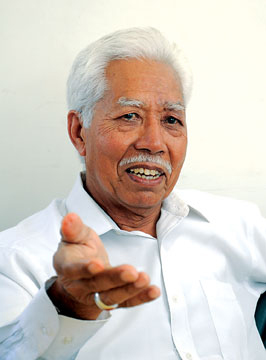July 2010
http://ecs.com.np/living_category.php?category=3&id=1
The humble kera (banana) comprises 60% of fruits in Nepal,” says Shiva Bahadur (Nuchhe Pradhan) Nepali. “But there is no research done on kera at all in Nepal!” Nepali did his Masters in
Agriculture from Punjab Agriculture University and joined government
service as a horticulturist. From 1977 to 1979 he was the Director
General of the Department of Agriculture. He says, “When I was the
Director General, we did a pilot project with USAID involving 24,000
hectares of land. The Americans were impressed with the results.”
Nepali did his Masters in
Agriculture from Punjab Agriculture University and joined government
service as a horticulturist. From 1977 to 1979 he was the Director
General of the Department of Agriculture. He says, “When I was the
Director General, we did a pilot project with USAID involving 24,000
hectares of land. The Americans were impressed with the results.”
http://ecs.com.np/living_category.php?category=3&id=1
The humble kera (banana) comprises 60% of fruits in Nepal,” says Shiva Bahadur (Nuchhe Pradhan) Nepali. “But there is no research done on kera at all in Nepal!”
No research at all? “No
research at all!” say Nepali.
 Nepali did his Masters in
Agriculture from Punjab Agriculture University and joined government
service as a horticulturist. From 1977 to 1979 he was the Director
General of the Department of Agriculture. He says, “When I was the
Director General, we did a pilot project with USAID involving 24,000
hectares of land. The Americans were impressed with the results.”
Nepali did his Masters in
Agriculture from Punjab Agriculture University and joined government
service as a horticulturist. From 1977 to 1979 he was the Director
General of the Department of Agriculture. He says, “When I was the
Director General, we did a pilot project with USAID involving 24,000
hectares of land. The Americans were impressed with the results.”
He also asserts, “I was
one of the architects of the first 10-year Agriculture Development Plan
conceived back in 1975.”
So, what were the
results? “It was terminated after 5 years. We made the mistake of
bringing the Irrigation Department into the picture. They were only
interested in huge schemes where there
was plenty of scope for huge kickbacks and commissions.”
In 1981, he entered the
ranks of FAO which had its headquarters in Rome. “I worked for 6 years
each, in Yemen and Pakistan, and 3 years in Uganda. “
In 1991-1993, he was
made the Executive Director of The Nepal Agri Research Council. “ During
this time, I helped establish the Citrus Research Council in Dhankuta,”
he informs.
Why citrus? “Because
citrus should actually be the national fruit of Nepal,” he opines. “You
know, suntalas (oranges) are grown all over the hills from the east to
the west. There is a glut in production in the season.”
What about apples? “They
are also good for Nepal. I remember, once I had mooted the idea of
growing apples in Jumla. But my superior put it off with the flippant
remark that ‘the man who can grow apples in Jumla is a good
horticulturist but a bad economist.’” Nepali gets a bit worked up about
this and says, “Apple farming and road building could have gone together
and this would have helped in Jumla’s development.”
So, in his capacity as
an expert, how does he see the development of fruit cultivation in the
country? “It was good till 1980,” he says. “After that, it’s all
downhill. Whatever little is being done is done totally by the private
sector. The government’s role is zero.”
No comments:
Post a Comment